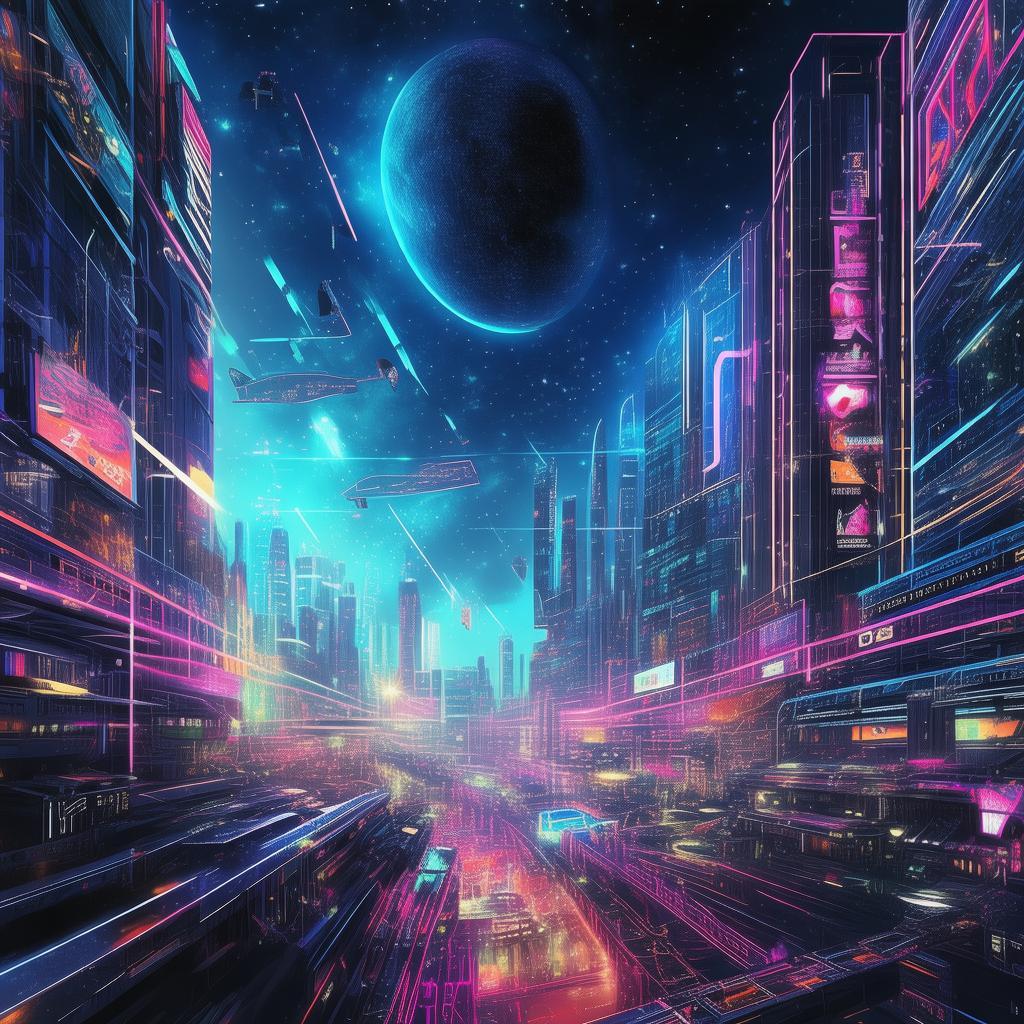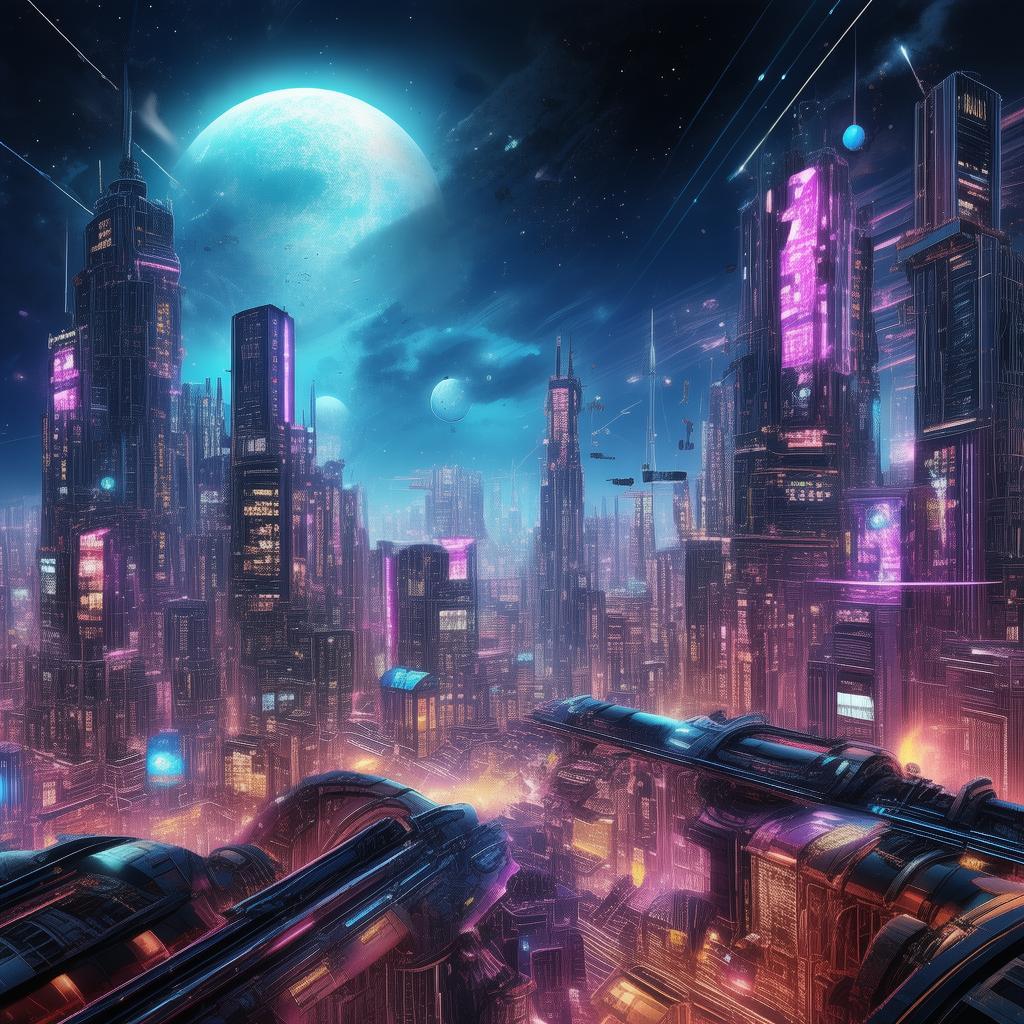The Starlit Symphony: A Cosmic Karaoke Extravaganza
In the heart of the Andromeda Galaxy, where stars are the stage and cosmic dust is the backdrop, a small ship named "The Melodious Odyssey" glided through the vastness of space. The ship was piloted by Captain Elara, a quirky and somewhat tone-deaf space explorer with a passion for music. Her crew, a motley collection of alien beings and humans, were just as eccentric and had one thing in common: they were all members of a group called "The Harmonic Hooligans."
The Harmonic Hooligans were no ordinary band. They were a group of misfits who had gathered in the vastness of space, each bringing their own unique talent to the table. There was Zorblax, a sentient, glowing orb from the planet Lumina who could play any instrument he touched; Lira, a human who could mimic any voice she heard, and her sidekick, a small, talking robot named R2-Melody; and then there was the enigmatic Captain Elara, whose voice was often as out of tune as her navigation skills.
Their latest adventure had led them to the Andromeda Galaxy's annual interstellar singing contest, "The Starlit Symphony," where they hoped to make a name for themselves among the galaxy's most renowned performers. The contest was a mix of spectacle and competition, featuring the most talented vocalists from across the cosmos, each performing in front of a crowd of spacefaring spectators.

The contest's grand prize was a chance to perform at the legendary space opera, "The Celestial Concert," where the greatest stars of the universe came together to perform. It was the dream of every singer in the galaxy, and The Harmonic Hooligans were no exception.
The first round of the contest was a spectacle of cosmic variety. Each singer performed their hearts out, their voices echoing through the star-studded auditorium. The Harmonic Hooligans took the stage, and to the shock of everyone, they decided to perform a cover of the classic space opera tune, "The Final Overture."
As they began, the audience was caught off guard. Instead of the usual soaring notes and dramatic crescendos, the Hooligans turned the classic piece into a raucous, upbeat cosmic karaoke session. The crowd erupted in laughter and applause, and it wasn't long before the Hooligans were the talk of the galaxy.
Their performance was a wild mix of humor, improvisation, and unexpected twists. Lira's robotic voice added a unique touch, while Zorblax's glowing orb played a rhythm that was both alien and familiar. Captain Elara, in her usual fashion, tried her best to sing in tune but ended up creating a symphony of off-key melodies that only added to the chaos.
Word of their performance spread like wildfire, and soon, The Harmonic Hooligans were invited to participate in the semi-finals. But this time, they had to face the most challenging round yet: the "Cosmic Karaoke Extravaganza."
The Extravaganza was a series of random challenges that tested the contestants' musical versatility and creativity. Each round featured a different theme, from "Space Opera Hits" to "Alien Lullabies." The Harmonic Hooligans, however, were not ones to shy away from a challenge.
In one round, they were asked to perform a duet with a space whale, which resulted in a whimsical, watery melody that had the audience swaying in their seats. Another round had them performing a medley of space-themed songs from various eras, blending everything from the golden age of space rock to the modern hits of interstellar pop.
As the competition progressed, the Harmonic Hooligans began to understand that the true spirit of the Starlit Symphony was not just about winning the prize, but about the journey and the connections they had made along the way. They formed bonds with other contestants, sharing stories and songs, and in doing so, discovered that their true talent was not just in their voices, but in their camaraderie.
The climax of the competition arrived when the final round was announced: a freestyle battle between the two remaining groups. The Harmonic Hooligans and their competitors, a group of serious opera singers from the planet Vokara, were set to perform a set of duets, with each group contributing one song.
As the stage lights dimmed, the Harmonic Hooligans took their places. They decided to perform a duet that would showcase their unique style, blending their comedic energy with the operatic grace of the Vokara singers. The song was a classic space opera, but with a twist—the lyrics were written on the spot, a result of a spontaneous brainstorming session with their new friends.
The performance was a resounding success. The Harmonic Hooligans' playful banter and the Vokara singers' polished vocals created a symphony of laughter and music that left the audience in awe. When the final note was played, the crowd erupted into cheers and applause.
In the end, The Harmonic Hooligans didn't win the grand prize. But they didn't care. They had won something far more valuable: the respect and friendship of the galaxy. The Starlit Symphony had shown them that fame and recognition were not the ultimate goals, but that the true magic of music was in the joy of creation, the connections made, and the memories shared.
And so, The Harmonic Hooligans set off on their next adventure, their ship filled with laughter, music, and the knowledge that no matter where they went, they would always be the heart of any cosmic karaoke Extravaganza.
✨ Original Statement ✨
All articles published on this website (including but not limited to text, images, videos, and other content) are original or authorized for reposting and are protected by relevant laws. Without the explicit written permission of this website, no individual or organization may copy, modify, repost, or use the content for commercial purposes.
If you need to quote or cooperate, please contact this site for authorization. We reserve the right to pursue legal responsibility for any unauthorized use.
Hereby declared.









